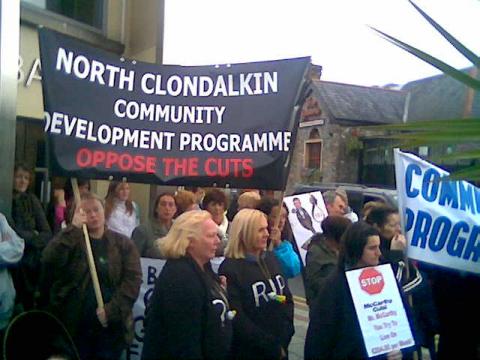Budget 2010: hitting the poorest people and most marginalised communities

As the dust begins to settle on Budget 2010, the real impact of this budget on people’s health and well-being is beginning to emerge. How will Budget 2010 hurt some of the poorest and most marginalised in our community? The impact of the cuts on some community projects and the response of the Community Platform needs to be examined further.
(Pictured: Two local women taking part in "A Song and a Dance" Community Dance Project for Seniors in Dublin’s Docklands)
On Monday of this week, 30 of the country’s 180 community development projects heard through email that they were no longer “viable” and funding would cease on 31 December. These include projects working with travellers and marginalised urban and rural communities. Also, projects in the North Inner City Dublin, Ballyfermot, Ballymun and Clondalkin are up for the chop.
The other 150 projects, if they wish to continue to be funded, are to be merged with their local partnership boards – this means they will lose their local autonomy as they will no longer be led by local people with the ability to respond flexibly to local needs. These projects are often based in the poorest communities. They provide many vital services such as;
- childcare, after school programmes, groups for older people and lone parents
- employment to local people in the projects and on 'Community Employment' schemes
- they act as a hub for funding for other services and supports such as primary care teams
- they are the vital link between community and state services
In 1990, there were 15. Now, there are 180 CDPs around the country which have received huge investment over the last 15-20 years.
It is not just community projects that are being cut. This is where the invisible bits of the budget are emerging. Yesterday on Morning Ireland, Emma O’Kelly talked through 55 posts being lost in the youth services, the drugs task force budget is also being cut by one third.
Many of these projects bearing the brunt of the cuts are the fabric of these communities, a lifeline for the most marginalised in society. Like building a railway infrastructure, it takes decades to build but these community projects can be dismantled very quickly. However, the ramifications will be felt for decades.
On 17 December the Community Platform, which is network of organisations and networks working against poverty and inequality, met to express their outrage at the impact of the budget on the most vulnerable. They clearly outlined how this government’s budget chose to hit the poor. They also outlined a range of measures where the government could have saved money without cutting social welfare, the wages of very low earners, carers, people with disabilities, lone parents and struggling families.
In particular, they emphasised the collective impact of the budget on low income families, that it is not one measure alone but the cumulative impact that a range of measures which combine to significantly cut the wages of carers, those on social welfare and low public sector workers.
Donal Toolin, a disability rights activist spoke most eloquently at the meeting about his experience of disability, about how people with disabilities who are poor, get sick more often and die younger. He also spoke of the cumulative health impact of being a wheel chair user for 30 years, about being a rights activist for 20 years. While we don’t know the specific societal consequences of last week’s budget, we know it will directly push more people into poverty and, consequently, early death.
Tony McCashin from Trinity College spoke about the complexity and the unfairness of the Irish tax system, how recommendations to make the tax system simpler and fairer have existed since the 1980s– yet these have been consistently ignored by government
